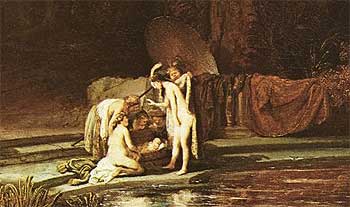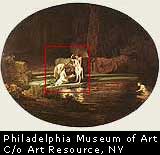
From the Ethical to the Religious
There is another midrashic orientation, which attempts to elevate Pharaoh's daughter's ethical behavior in saving the Hebrew child to a religious plane, in order to make her association with Moses more acceptable.
And Pharaoh's daughter went down to bathe on the Nile. To purge herself of the idolatry of her father's house. (Exodus Rabbah 1:23)
In this midrashic text the rabbis have portrayed Pharaoh's daughter as having renounced her father's idolatrous ways even before she fatefully encounters baby Moses. This not only explains how she defied her father's decree with such temerity, but also neutralizes the traditional reader's discomfort with Moses being raised by a surrogate mother who was pagan.
In addition, the midrash credits Pharaoh's daughter not just with humanitarian tendencies but also with religious ones. She nobly assumes a position along side Moses's mother Jocheved, his sister Miriam, the midwives Shifrah and Puah, and Moses's wife Zipporah - all women in the Exodus narrative who save others from the clutches of death. By moving Pharaoh's daughter's deed from the ethical to the religious level, the Rabbis have highlighted a phenomenon, which we will re-encounter in the development of her adopted son Moses. His ethical coming of age will be set in motion through his profound humanitarianism, as he comes to the aid of the victimized Hebrew smitten by the Egyptian (Exodus 2:11). This will be Moses' first decided stride toward moral justice, which in turn will transport him to the religious sphere, where he will leave his indelible imprint upon the history of the nation. Perhaps Moses derived this leadership quality from his stepmother and the other women of the Exodus who served as his inspirational role models.
